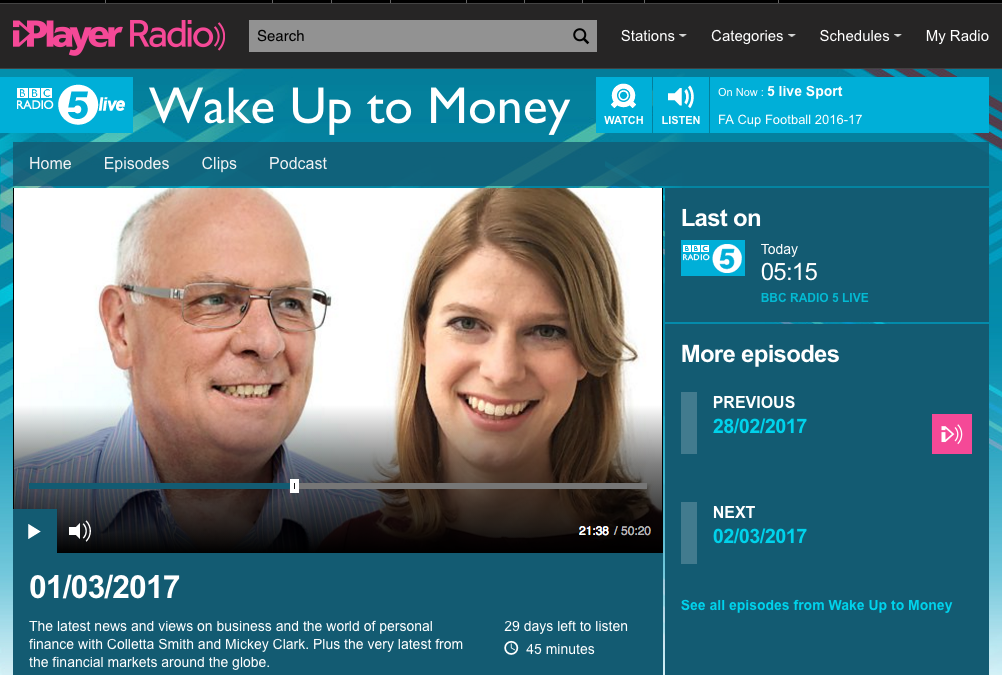
Mar 1, 2017 | BBC World Service, Entrepreneurship
Last night, Donald Trump delivered his first address to Congress. For the first time, Trump actually appeared both presidential and optimistic as he delivered an upbeat message that called for unity and bipartisan action. But was it just a facade? Can Trump possibly deliver on his ambitious promises of generous tax cuts, massive infrastructure investment and immigration reform? After all, just hours before his speech promised “clean air and clear water” for all Americans, he signed an executive order dismantling EPA protections for lakes and waterways in the U.S. There are already cracks in the facade and many unanswered questions.
The BBC’s 5 Live asked me to share my perspective as Britain woke in sleepy amazement to this presidential performance.
Report by Alison van Diggelen, host of Fresh Dialogues
Listen to the BBC Podcast (starts at 21:36) or to the 4 minute clip below:
Audio Player
Here’s a transcript of our conversation, edited for length and clarity.
Colletta Smith: In the last few hours, the U.S. President Donald Trump delivered his first speech to Congress. He covered some familiar themes like job creation and infrastructure investment….The Silicon Valley journalist Alison van Diggelen is on the line this morning. Good morning Alison!
Alison van Diggelen: Good morning, great to join you.
Colletta Smith: Thank you for joining us again. You’ve been helping us with this whole story over the last year of Trump’s (campaign and) election. This would not normally make the headlines: a president outlining potential budget negotiations. Yet it has with Trump, because we were expecting a surprise. And perhaps the surprise is that there wasn’t really a surprise in the speech that he gave?
Alison van Diggelen: His performance tonight was a sharp contrast to the chaotic first 40 days of the Trump presidency. He was very presidential tonight. He stuck to his script and he had a much softer approach. He had a lot of “gifts” for everyone. He’s proposing what he calls “massive” tax relief for the middle class, cuts to corporate tax; $1 Trillion in infrastructure spending and a military spending increase of $54 Billion, which to put in perspective is the entire annual budget for UK military.
Colletta Smith: When it comes to adding up those sums…do we have any more details as to how he plans to finance those extra boosts?
Alison van Diggelen: That is the big question. It’ll be interesting to see how the markets respond. There are so many outstanding questions:
- How is he going to pay for these tax cuts and infrastructure spending?
- Can he get these measures through Congress?
- Will the Federal Reserve undermine his actions by increasing interest rates?
- Will he start a trade war with his tariff plans and threats to renegotiate multilateral trade agreements like NAFTA?
There are so many questions unanswered, so many details unanswered. There’s a big question mark over what the future holds.
Colletta Smith: At what point does the electorate, his supporters demand that detail?
Alison van Diggelen: The stock market is on a roll right now. The market is up 10% in the ” Trump rally” since the election. Who knows if that can continue? As we all know, the stock market can turn on a dime. It depends on optimism and if the market keeps that optimism. One analyst said, “The market likes to trade on hope,” and all these issues – tax cuts, deregulation, infrastructure spending – they’re all boosts to economic growth, but at some point if he’s not able to push ahead and make progress in Congress, there may be an adjustment of that optimism and people will say: these wonderful (economic stimulus) “carrots” are not going to happen, and then things could take a nose dive.
Colletta Smith: Alison van Diggelen, Silicon Valley journalist. Thanks as ever for joining us and giving us your analysis this morning.
Read more on Trump’s speech from the BBC and The Guardian
“According to a CNN/ORC poll of about 500 speech watchers, 57% said they had had a very positive reaction to President Trump’s Congress address, with seven out of 10 saying they believed his policies would move the US in the right direction.
His popularity, however, has hit a historic low for modern presidents after a month in office – just 44% of Americans think he is doing a good job, according to RealClearPolitics.
Mr Trump’s young presidency has been overshadowed by missteps including a high-profile court defeat to his controversial travel ban and the firing of a top aide.” BBC News
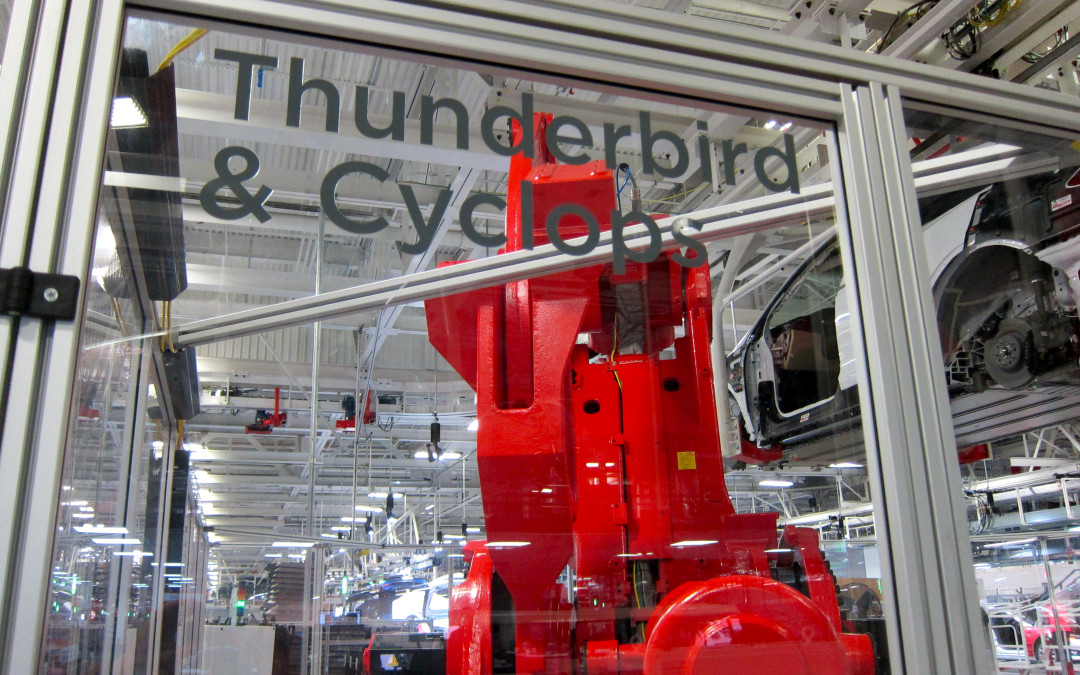
Feb 24, 2017 | BBC World Service, Clean Tech, Electric Vehicles
Elon Musk continues to make ambitious plans for Tesla Motors, some even call them “ludicrous.” Not content to make a niche product for electric vehicle enthusiasts, he now wants to conquer the mass market, competing in the major leagues against GM, BMW, Ford et al. Musk is promising an annual production of 1 million cars by 2020, a staggering increase from last year’s paltry: 76,000. Is he insane?
On a conference call with Musk and media colleagues this week, Alison van Diggelen, host of Fresh Dialogues learned that Musk is still calm and laser-focused on executing his “Tesla Master plan.” This year is crunch time for Tesla. The future of the company rests on the timely and efficient production of the Model 3, Tesla’s smaller, mass market car. Will demand stay strong, despite intense competition and reservation holders threatening to cancel due to his position on Trump’s economic advisory team? Musk seemed to flounder a bit on this question and refused to disclose the latest reservation numbers, for fear of analysts “reading too much into them.”
During the discussion of Tesla’s 2016 financial results, some anomalies arose. Despite continuing to make massive losses (due to capital investment in the Tesla Factory and the Gigafactories), its share price is still in the stratosphere. Tesla might produce a small fraction of GM and Ford’s output, but the company is valued on par with them. What gives?
“The recent run-up in Tesla stock has less to do, in our view, with anything around the near-term financials, and more to do with the nearly superhero status of Elon Musk,” Barclays analyst, Brian Johnson.
Superhero status? More ludicrousness…The superheroes Tesla is focused on are the mighty robots on the factory floor. Musk has named them after X-men superheroes, like Cyclops and Thunderbird (see photo above); and they’re the ones that’ll have to earn their superhero status as manufacturing goes into top gear in the next few month.
“Tesla is going to be hell-bent on becoming the best manufacturer on earth.” Elon Musk
The BBC’s Fergus Nicoll invited me on Business Matters to help explain more.
Listen to the full podcast on BBC World Service (starts at 37:30) or the 5 minute clip below:
Audio Player
Here’s a transcript of our conversation (edited for length and clarity):
BBC Host, Fergus Nicoll: Tesla stock has hit record highs, soaring 50% since December. With investor confidence growing that Tesla will deliver its Model 3 on time. Let’s explore this with Alison in Silicon Valley. Before we get into the nitty gritty of Model 3, and the other numbers, I know you watched Elon Musk do the webcast that go with the Q4 figures. What kind of presentation did he come up with?
Alison van Diggelen: I listened to the (live conference call) podcast. Elon Musk was on the podcast with his (retiring) CFO, answering questions from the media. They were generally upbeat. Elon Musk always over-promises how soon his vehicles will be delivered, but he is confident that they’re going to start deliveries of their Model 3 in July of this year, for employees first…beta testing for employees. He’s hoping for the mass rollout starting in September of this year. They’re pretty bullish about that.
Fergus Nicoll: Here’s the thing: Tesla has a valuation pretty close to Ford. But compared to Ford it makes about five cars! So what are we seeing? A massive future priced into that?
Alison van Diggelen: That’s right. Last year, Tesla delivered 76,000 vehicles (compared to Ford’s 2.5 million), but Elon Musk is very bullish. He’s aiming for the factory to produce 500,000 cars by the end of 2018, and one million a year by 2020. He’s ludicrously ambitious. Brian Johnson, who’s an analyst with Barclays, called this run up in the Tesla stock more “Elon Musk superhero status” than short term financials. What Elon Musk says, he often delivers….eventually.
Tesla merged with SolarCity, the rooftop solar provider, so that is also giving an upside. They’ll be able to cut costs: Tesla showrooms will also become showrooms for the SolarCity solar panels. They’re also doing the other side of the equation: energy storage….
Fergus Nicoll: The household and business batteries.
Alison van Diggelen: Exactly.
Fergus Nicoll: The thing is, Americans drive insane distances. Electric cars have to go a long way….the infrastructure has to catch up with the company?
Continue listening to the podcast clip above, or at BBC Business Matters for more about:
The ambitious supercharger network expansion
The fact that all cars will be equipped to be fully self-driving
Why the market continues to bet on Elon Musk
***
For Tesla to succeed in becoming “the best manufacturer on earth,” three big questions remain:
- Will the Tesla Model 3 be delivered on time and on budget this year?
- Will demand stay strong for Tesla, despite stiff competition from GM, Ford, BMW, Nissan, etc?
- Can Tesla make the huge capital investment required (for the Tesla Factory and Gigafactories expansion), without running out of money?
Read more about Tesla and Elon Musk from Fresh Dialogues archives
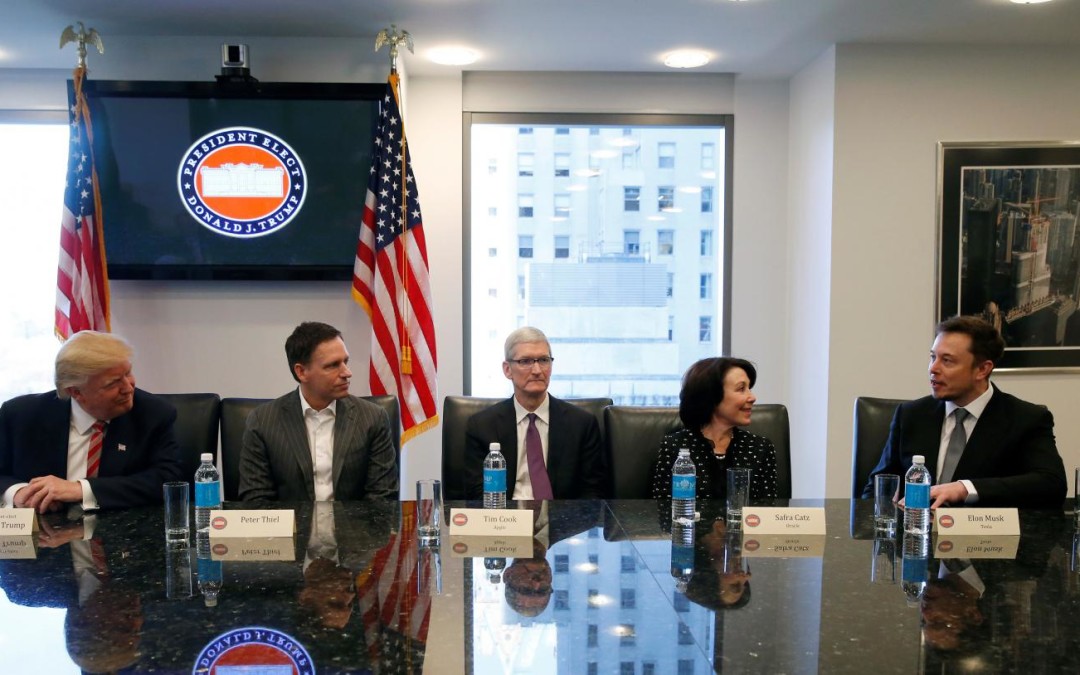
Feb 17, 2017 | BBC World Service, Clean Tech, Policy, Summits & Conferences
By Alison van Diggelen, host of Fresh Dialogues
Since Tesla CEO Elon Musk joined the Trump business advisory team in December he’s been under intense pressure to step down. That pressure intensified this month after Donald Trump signed an executive order banning immigrants from seven countries with Muslim majorities. On February 2nd, Musk’s colleague, Uber CEO Travis Kalanick pulled out of the Trump team after a widespread #DeleteUber campaign went viral and his employees urged him to withdraw.
“Joining the group was not meant to be an endorsement of the President or his agenda but unfortunately it has been misinterpreted to be exactly that,” wrote Kalanick to his staff.
Musk faced a barrage of similar criticism, with some saying he’s a crony capitalist and others claiming to have cancelled their orders for Tesla Model 3.
Last week, I joined the BBC’s Fergus Nicholl on the BBC World Service program, Business Matters. We discussed Silicon Valley tech’s furious reaction to the Trump travel ban and Elon Musk’s high pressure predicament.
Listen to the podcast excerpt below (it includes commentary from the always provocative Lucy Kellaway):
Audio Player
Here’s a transcript of our conversation (edited for length and clarity):
Fergus Nicoll: Elon Musk has run into Twitter trouble…when he spoke to Mr. Trump in person and when he was seen having a drink with Steve Bannon in the White House, a lot of people said: “What on earth are you thinking?” And he came up with a fairly strong defense…
Alison van Diggelen: His key message is: “Activists should be pushing for more moderates like him, to advise the president not fewer.” And he asks, “How could having only extremists advise him possibly be good?”
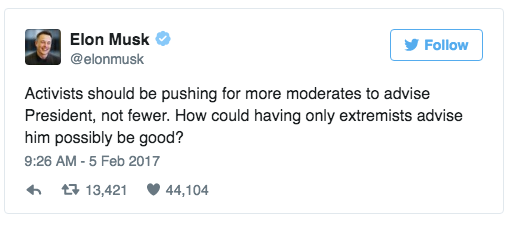
.
Alison van Diggelen: He’s faced a lot of criticism, people even saying they’re cancelling their orders for the next generation of cars, the Tesla Model 3. He is under this pressure, but he is a powerful influencer, a poster child for Donald Trump’s manufacturing jobs being in the U.S. Musk is an idealist, he wants to save the planet. He’s bringing his message of climate change and green jobs, almost as a Trojan horse, into Trump’s meeting rooms. I think a lot of people who think about this deeply deeply, are not having this knee jerk reaction and saying don’t associate with Trump. Instead they’re saying this might be a good conduit for Trump hearing this green point of view.
Here is some of the pushback Elon Musk received on Twitter and his responses:
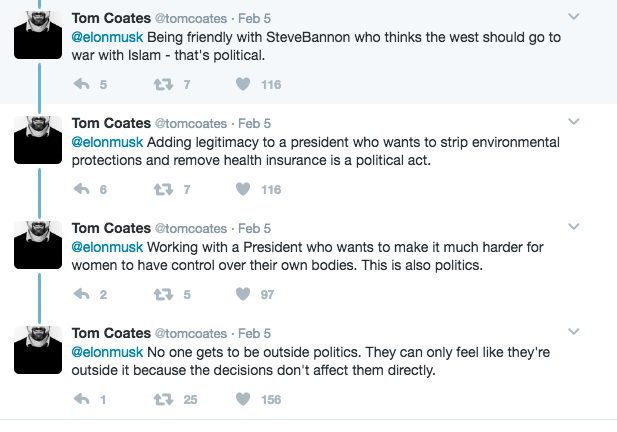
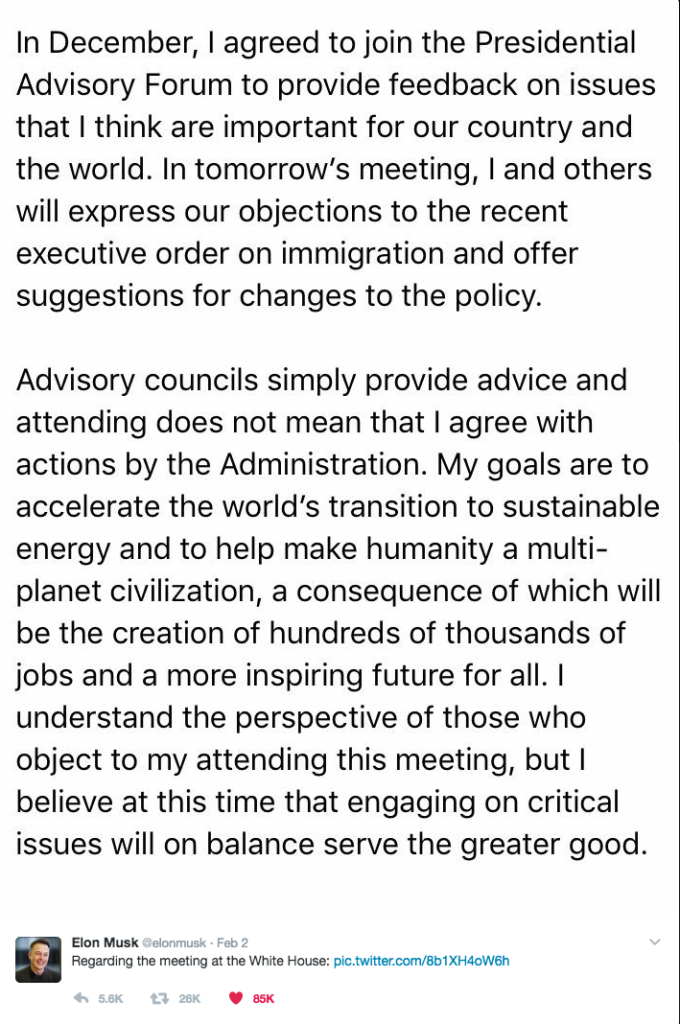
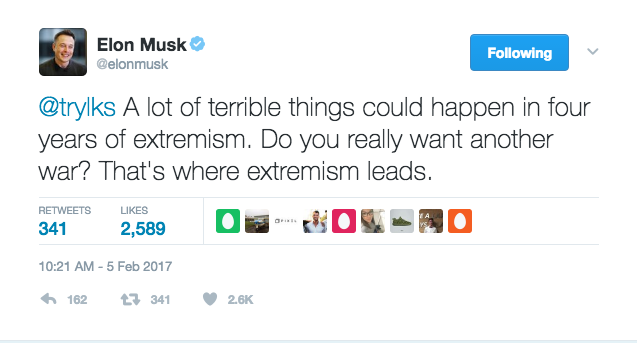
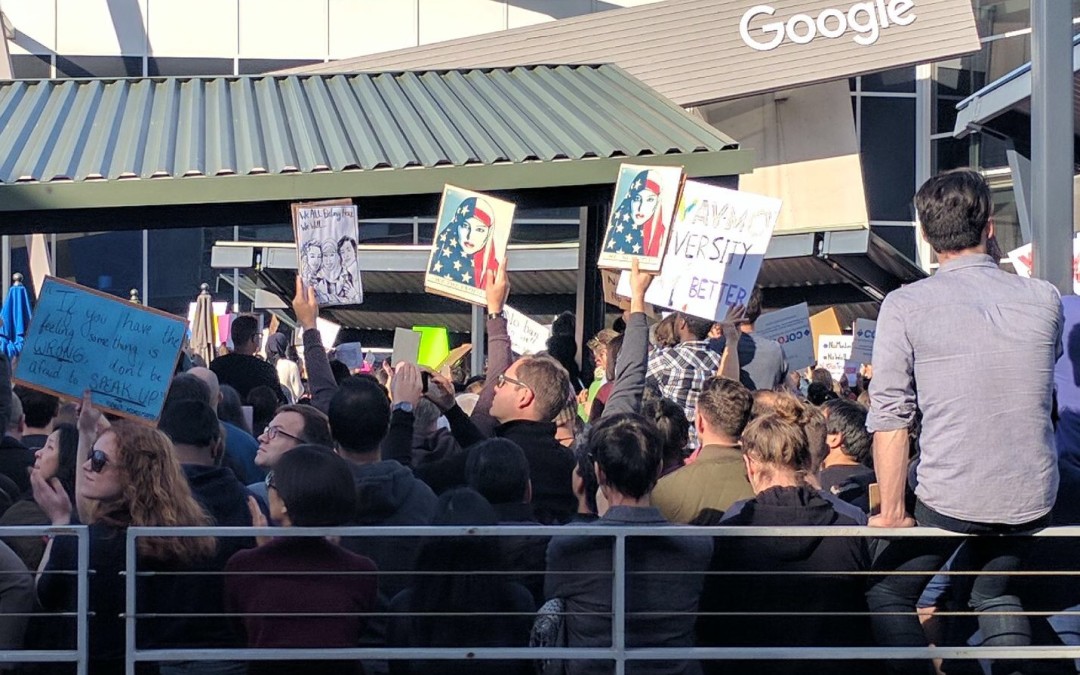
Feb 7, 2017 | BBC World Service, Entrepreneurship, Entrepreneurship & Innovation
By Alison van Diggelen, host of Fresh Dialogues
In the beginning…there was no word from Silicon Valley tech leaders on Donald Trump’s presidency, despite his kingly proclamations: Let there be Two Pipelines, Let there be a Wall…Let there not be TPP!
But on the seventh day, tech leaders arose against Trump’s dominion over them when his immigration order unleashed chaos for their people. And so, on the 16th day, they filed a legal brief saying the order inflicted “significant harm on American business, innovation and growth.”
Today in San Francisco a US Court of Appeals will decide oral arguments in the case: State of Washington et al. vs Donald J. Trump et al..
I joined the BBC World Service’s Business Matters last night to report on Silicon Valley’s furious reaction to Trump. Venture capitalist, Jean-Louis Gasse spoke for many in the valley:
“The danger with an administration or a president like Donald Trump is that he gives permission to lie…to be offensive, to be homophobic, to be xenophobic. Cultures are nothing but a system of permissions and those come from the top. When you see the President of the US lying – you have to stand up and say: it’s a lie!” Jean-Louis Gasse, Silicon Valley venture capitalist
Listen to the BBC World Service podcast, (my report starts at 5:15).
Audio Player
.
Here’s a transcript of our conversation (edited for length and clarity) and a longer version of my report:
Fergus Nicoll: Donald Trump says he is pro-business. But a lot of businesses, it seems, are not pro-Trump. They’re certainly not in favor of his attempt to restrict immigration. Almost 100 mainly tech companies have filed an amicus brief arguing that the ban – already the subject of a separate legal process – inflicts significant harm on American business. Who’s signed up? Apple, Google, Microsoft, Facebook, Twitter and belatedly Tesla. I’ll hand over to Alison in a moment – but first, let’s hear from Emily Dreyfuss at the tech news website Wired in Boston.
Emily Dreyfuss: By some estimates, half of unicorn startups in America were founded by an immigrant. These big companies, Apple, Google, Facebook: they depend on H1-B visa holders. 85,000 H1-B visas go to the tech community every year in America. This is affecting their bottom line. Yes, there is some risk but I think these technology companies are calculating that together they are stronger which is why they’ve signed on to this amicus brief. I think what we’re seeing here is a clash of ideology and business acumen. In this instance, Trump saying he’s pro-business is actually just talk.
Fergus Nicoll: Is that a fair summary then, Alison…the way it’s seen on the west coast?
Alison van Diggelen: Trump is saying that he’s pro-business (and I believe he intends to be), but it looks like his immigration ban has not been thought through… as to the impact it’s going to have on business. It’s been severely criticized .
I’ve been closely watching Silicon Valley’s reaction to the Trump presidency since inauguration day. When Trump issued that immigration order some Silicon Valley leaders were compelled to break their silence and take action. It’s an issue that’s split the US in two. A CNN poll shows about 53% oppose the ban. But today Trump has said that negative polls about the travel ban are “fake news.” He accused the NY Times of making up stories and sources. So my report explores why Trump is getting under Silicon Valley’s skin via this travel ban and the role of lies and fake news.
The day after he was inaugurated, Silicon Valley took to the streets to protest. Tens of thousands of marchers carried placards saying “Stop the hate”; “Words Matter”, and “Never Again.” I asked Patrick Adams, a local science teacher…What’s your message for Trump?
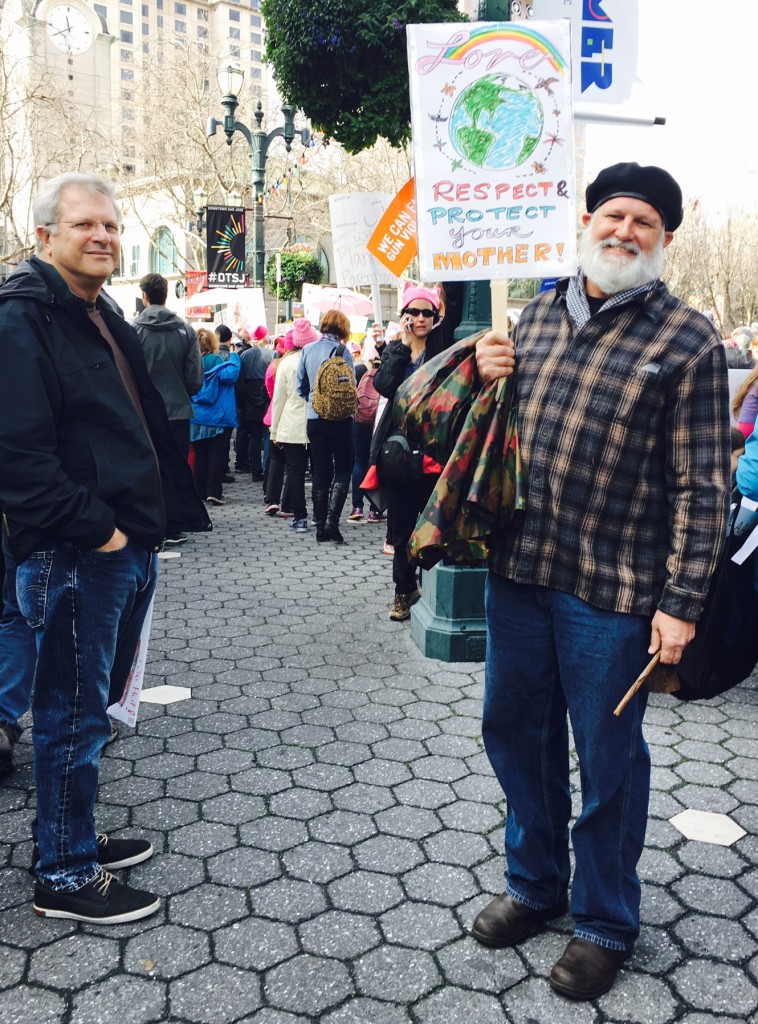
Patrick Adams: Get out of the way…this is a tsunami, this is people who care deeply about what this country really stands for – which is inclusion and love and hope – it’s unstoppable. This idea: that the trickle down economics of neoliberalism and the strange backward thinking of racism is going to lead us to a better world? It’s not, it’s a dead end.
Alison van Diggelen: In the first week of Trump’s presidency, it appeared like “business as usual” here in SV. On day seven, Trump’s immigration order lit the fire under SV.
By day 10, protests had broken out at several tech campuses; and business leaders came out of their bunkers to voice concerns about the order’s morality, not just its economic impact. It was personal: almost 60% of Silicon Valley engineers are foreign born.
I spoke with Meg Whitman, CEO of Hewlett Packard Enterprise, a company born here in 1939:
Meg Whitman: Our view is that this was a mistake. We are a nation of immigrants and a broad-brush sweep of seven countries, of Muslims in those seven countries, is not what America is. So I hope that the president rethinks…
If you think of the innovation that’s been done in the valley over the last 75 years, much of it is from people who came here from someplace else … that’s an economic engine of the country and an economic engine of the world…
Alison van Diggelen: Alphabet’s chairman, Eric Schmidt even described the Trump administration actions as “evil” but many responses were muted.
I contacted companies, from oil to solar; from startups to Fortune 500, but many declined to talk, even LinkedIn cofounder Reid Hoffman who was an outspoken critic of candidate Trump. Why the silence?
Is it the prospect of Trump unleashing his Twitter followers? Kevin Surace, CEO at Appvance, a software company, sums it up:
Kevin Surace: No one wants the current leader of the free world to unleash something against them. And frankly as a CEO of a corporation, it’s your duty to your shareholders to not have the US government hate you…the last thing you want is the president saying: I’ve had it with your company, I’m going to slap tariffs on you…
Alison van Diggelen: Surace emphasizes that the stock market is up over 8% since the election and the Dow hit the symbolic 20,000 point milestone last month. Trump even hosted a “cordial” tech summit with many of the valley’s leaders. Three juicy carrots are now dangling their way: the prospect of infrastructure investment, a corporate tax cut and a huge tax break for the repatriation of $2.5 Trillion in corporate profits lying offshore.
Kevin Surace: If that all comes back to the US, it’ll be the biggest boom to the US economy, possibly ever. For the next 10 years, the economy will be on fire.
Alison van Diggelen: Nevertheless, venture capitalist, Jean-Louis Gasse addresses the disquiet in Silicon Valley. He points to H1-B visa concerns as well as a flood of uncertainties:
Jean-Louis Gasse: The stock market is up, up, up right now which we know could turn around on a dime…
It’s not good for biz to have too many uncertainties on immigration, on trade wars, on interest rates, on spending, on building a wall with Mexico…
Alison van Diggelen: Gasse was Steve Jobs’ right hand man when Apple first expanded into Europe. I asked him to sum up the Valley’s reaction to Trump:
Jean-Louis Gasse: They’re waking up to the fact that just like you need clean air and clean water… you need clean information for society to be healthy. It’s an issue of conscience for the people in tech to get up and say we’re going to fight fake news – especially the ones that stem from the top. The danger with an administration or a president like Donald Trump is that he gives permission to lie. … to be offensive…to be homophobic, to be xenophobic… Cultures are nothing but a system of permissions and those come from the top. When you see the President of the US lying – you have to stand up and say: it’s a lie!
Continues….
Check back soon for part II when we discuss:
Elon Musk’s role in Trump’s economic advisory council and why his decision to stay is so controversial, especially after Uber’s CEO stood down.
And Silicon Valley Leadership Group’s CEO Carl Guardino’s advice to Trump.
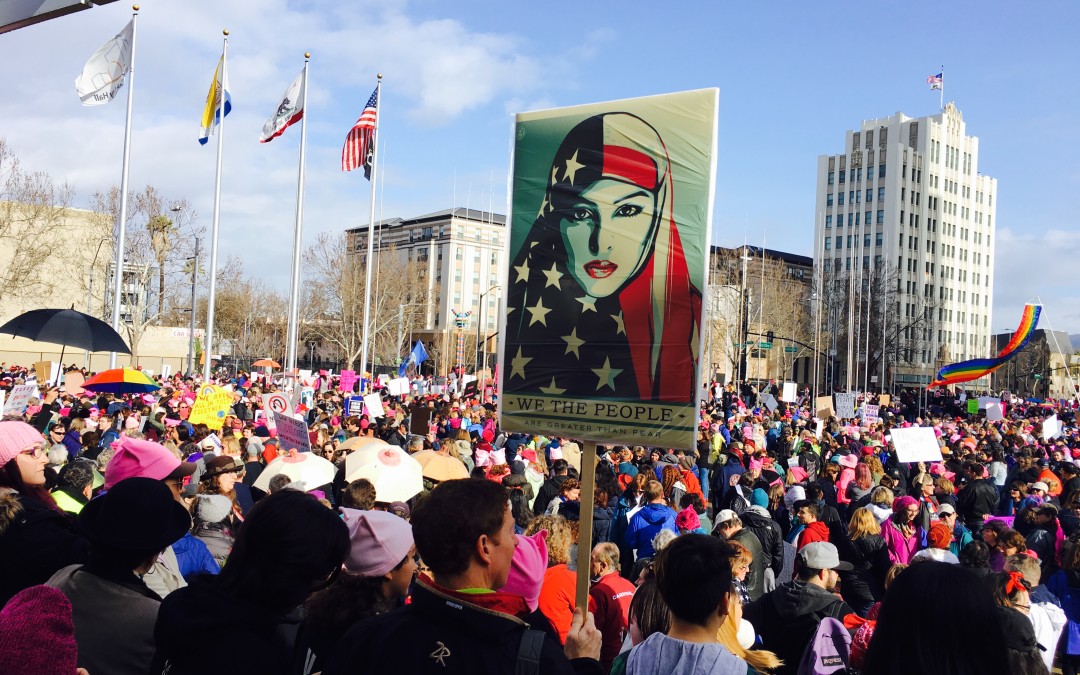
Jan 24, 2017 | BBC World Service, Inspiring Women, Silicon Valley Events, Technology, Women in tech
By Alison van Diggelen, host of Fresh Dialogues
It’s day four of the Donald Trump presidency and he’s already infuriated women’s rights campaigners, the environmental movement and free trade advocates by signing controversial executive orders. Tech mastermind, Steven Levy put it best in his latest tech report: God help us all.
Millions around the world took to the streets within hours of Trump’s inauguration, in anticipation of these actions and more to come. The San Jose Women’s March took place here in Silicon Valley on Saturday, and in my twenty years in the South Bay, I’ve never witnessed such an outpouring of alarm, dismay and rage. One 70-year old educator I interviewed said that this was the first time in her life, she’s ever felt the need to stand up and take to the streets: not for women’s rights, not for civil rights, but to protest Trump’s presidency. And she was fired up. Today, my report aired on the BBC World Service.
One protester had this message for Silicon Valley tech leaders:
“Lead with faith, lead with truth, and lead with a kind of human dignity that is absent in a lot of our daily conversations…They gotta get rid of the fake news, people are being led down a kind of primrose path, thinking that by being angry and violent they’re going to create a better world for the future…that’s not the path, the truth, the reality that everyone can see here today,” Patrick Adams, science teacher at Bellarmine College Preparatory School in San Jose
Listen to my report and the discussion at the BBC World Service (from 2:40 in the podcast)
Gareth Mitchell: The President Elect became President on Friday….the crowds were back on the streets on Saturday, this time in protest at the new administration. The marches around the world were led by women, but in Silicon Valley, the tech people, male and female were venting their concerns too, along with scientists, and entrepreneurs, all of them worried by Trump’s stance on trade, innovation, science and the climate. It comes in an era of disquiet about Facebook and fake news, of post truth and cyber threats. To gauge the sentiment, our reporter in Silicon Valley, Alison van Diggelen, was at one of the marches.
Alison van Diggelen: I’m here at the San Jose Women’s March in the center of Silicon Valley and the women are out in force…
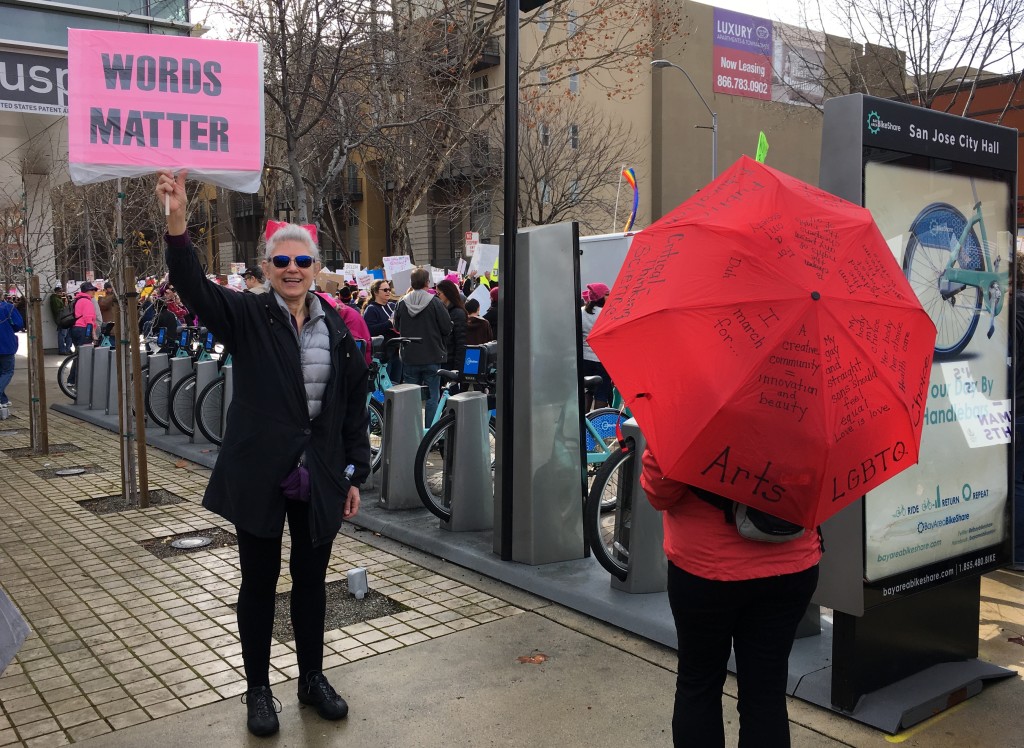
.
Yogacharya O’Brian (reading her poem, “Forward Women”): Not to the back of the line, because Delores walked in front; not to be held down, not even by gravity because Sally soared in space.
Alison: That was Yogacharya O’Brian, founder of the Center for Spiritual Enlightenment and one of the rally’s powerful speakers.
Alison van Diggelen: Silicon Valley took to the streets in record numbers on Saturday to protest the country’s new president. Donald Trump’s proposed tax cuts and infrastructure investment could benefit the tech community; the U.S. economy and many of those marching in Silicon Valley. As could his plans to repatriate millions of dollars of tech companies’ overseas profits. Last month Trump even hosted a cordial summit with some top tech leaders. Despite all this, many in this community are fearful of what his presidency might mean for innovation, transparency, multiculturalism, and social progress.
Nick Shackleford: I’m here because of Trump’s election…he is bringing America back in time instead of leading us forward. As a nation we need to go forward and not backwards.
Alison van Diggelen: Here in the world tech center of innovation, what do you expect from this community of innovators?
Nick Shackleford: Like you said, we are innovators and I think we’re going to continue to innovate and lead the country – and sometimes the world – in the innovations that are being developed here in the Silicon Valley. And we have a lot of millionaires and billionaires who are liberal, believe in the cause and are true Californians and they will continue their fight, be it with their money, and their power or just lending their voice to causes that are important to our nation.
Alison van Diggelen: What would you say to Mark Zuckerberg and people like him with power?
Nick Shackleford: I think Mark Zuckerberg did not to enough to stop the fake news. I think he cared more about (getting it re-shared and) his personal stake in his company…and he can’t convince me otherwise. He’s to blame for a lot of the fake media.
Alison van Diggelen: What would you have him do?
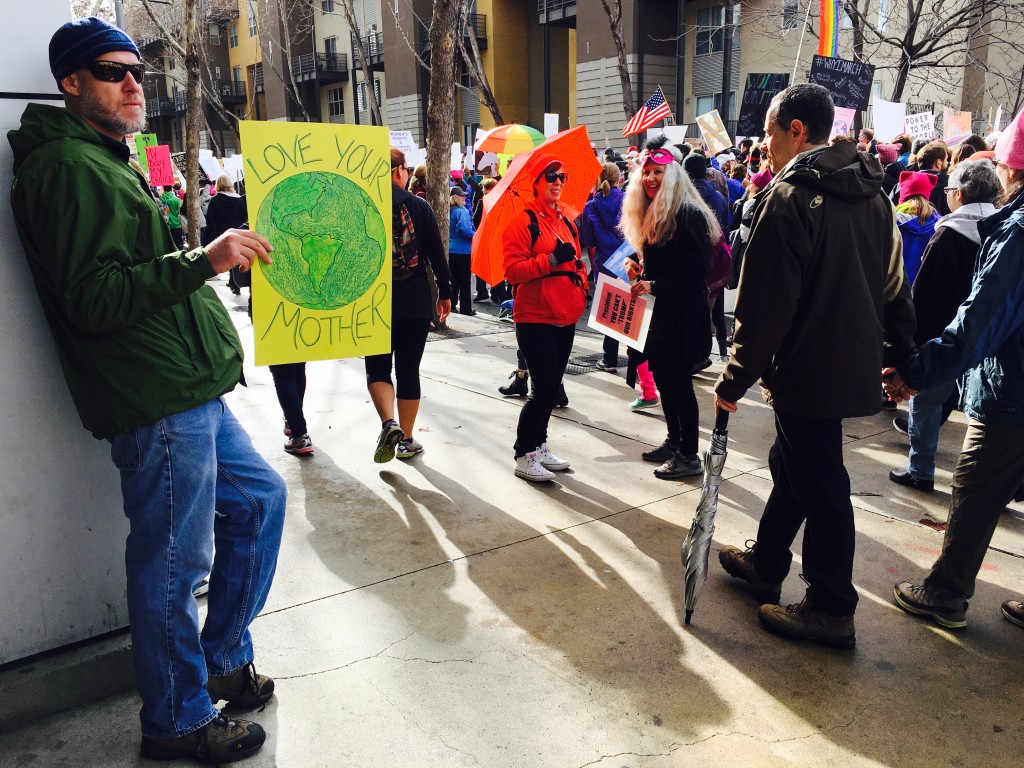
.
Nick Shackleford: I’ve reported about 100 things in the last six months and nothing has been in violation of their policy, but I’ve seen other people get the same picture and be sent to Facebook jail for it. So he’s not consistent, there needs to be more transparency on this fake news fight.
Patrick Adams: They gotta get rid of the fake news, people are being led down a kind of primrose path thinking that by being angry and violent they’re going to create a better world for the future…that’s not the path, the truth, the reality that everyone can see here today.
Alison van Diggelen: Patrick Adams was one of many men who came out to support the women’s march. Like many protesters who couldn’t keep quiet, he was energized by the proliferation of fake news, and Trump’s use of “alternative facts” which continues this week in the heated dispute over his inauguration numbers. Adams had a message for Silicon Valley’s tech leaders….
Patrick Adams: Lead with faith, lead with truth, and lead with a kind of human dignity that is absent in a lot of our daily conversations …Everywhere I go I see wonderful, amazing, beautiful people working together to make this future happen and I also see people who’re giving up…either to escape into an alternate world of the Internet or they want to pretend that this doesn’t affect them. But if affects everyone. Everyone is involved.
Yogacharya O’Brian: We do not wait for you to lead with sons and with daughters in hand, with husbands and with wives, lovers and friends by our side…we march!
Crowd chanting, cheering
[End of report]
Gareth Mitchell: What do you make of the comments you heard there, Bill Thomson?
Bill Thomson: It was fascinating to hear via Alison’s excellent report just how confused people are, and how uncertain they are; and how many different perspectives there are. For me, as a member of the press, what we need to be doing is reporting effectively on what’s actually happening, not just reporting on an agenda set by politicians…So the limitations on women’s reproductive rights, the Keystone XL pipeline, the Dakota Access pipeline, the Transpacific Trade Partnership, the nomination of the Supreme Court justice, are all far more important than the size of Trump’s inauguration crowd.
There’s a real sense from Alison’s report that many people are confused because they don’t know what’s actually going on and are trying to project on that. It’s the role of us in the press to cut through that and be much clearer about what’s actually happening and not get dragged into debates or agendas set by other people.
Read more stories about Donald Trump on Fresh Dialogues














